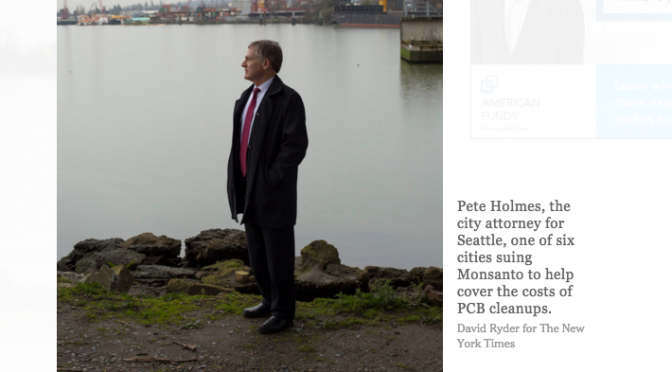Tag Archives: congress
Monsanto Given Legal Shield in a Chemical Safety Bill
WASHINGTON — Facing hundreds of millions of dollars in lawsuits, the giant biotechnology companyMonsanto last year received a legislative gift from the House of Representatives, a one-paragraph addition to a sweeping chemical safety bill that could help shield it from legal liability for a toxic chemical only it made.
Monsanto insists it did not ask for the addition. House aides deny it is a gift at all. But the provision would benefitthe only manufacturer in the United States of now-banned polychlorinated biphenyls, chemicals known as PCBs, a mainstay of Monsanto sales for decades. The PCB provision is one of several sticking points that negotiators must finesse before Congress can pass a law to revamp the way thousands of chemicals are regulated in the United States.
“Call me a dreamer, but I wish for a Congress that would help cities with their homeless crises instead of protecting multinational corporations that poison our environment,” said Pete Holmes, the city attorney for Seattle, one of six cities suing Monsanto to help cover the costs of reducing PCB discharge from their sewers.
The House and the Senate last year both passed versions of legislation to replace the 40-year-old Toxic Substances Control Act, a law that theEnvironmental Protection Agency acknowledged had become so unworkable that as many as 1,000 hazardous chemicals still on sale today needed to be evaluated to see if they should be banned or restricted.
Democrats and Republicans—along with the chemical industry and even some environmentalists—agree that the pending legislation would be a major improvement over existing law.But from legal liability shields to state-based regulatory authority, the House and Senate versions have major differences to resolve. The remaining disputes revolve around the basics of pre-emption: Who gets to sue? Andwho gets to regulate the chemical industry?
A Monsanto spokeswoman said the company had received no special treatment from the House or the Senate.
“Monsanto does not consider either version of the bill, with respect to the effect on preemption, to be a ‘gift,’ ” the spokeswoman, Charla Lord, said.
Already, attorneys general and top environmental regulators from 15 states have written to leaders in Congress demanding changes.
“Our future work depends on striking the right balance to strengthen the U.S. Environmental Protection Agency’s abilities and funding, without limiting state powers in creating and enforcing needed protections,” said aletter, obtained by The New York Times, sent by the top environmental regulators in California, Connecticut, Minnesota, New Hampshire, New York, Oregon, Washington and West Virginia.

Some of the most vociferous objections relate to the so-called Monsanto Clause. The provision does not mention the company by name, but between the early 1930s and 1977, Monsanto manufactured almost all of the 1.25 billion pounds of PCBs sold in the United States.
The chemicals were initially admired for their ability to prevent fires and explosions in electrical transformers and other equipment. But as the use of PCBs skyrocketed nationwide in products as varied as paints, pesticides and even carbonless copy paper, evidence mounted that they were contaminating the environment and potentially causing health problemsincluding cancer and immune-system complications. The E.P.A. banned their production in 1979.
PCB litigation has surged in the last year as cities and school systems struggle to comply with directives from federal and state regulators to reduce PCB levels in sewer discharge and in caulk once used to construct schools. Separately, a group of individuals who received diagnoses of a form of cancer known as non-Hodgkin’s lymphoma sued Monsanto last year, claiming the company should pay damages.
The Senate Environment and Public Works Committee, in a June reportaccompanying its version of the legislation, asserted that neither existing toxic chemical law nor any revisions pending in Congress should be seen as a way to “pre-empt, displace or supplant” the right to sue for damages in lawsuits like the ones filed against Monsanto.
The House also voted to preserve the right to sue if individuals or local governments believe they have been harmed by a chemical, regardless of future federal regulations of the substance. But a critical paragraph added to the House bill in late May made sure past regulatory requirements by the E.P.A. would continue to disqualify legal claims, and it specifically referred to the section of the 1976 toxic chemical law governing PCBs, giving Monsanto clearer authority in the future to ask judges to dismiss lawsuits filed against it.
Congressional aides involved in the drafting said the language was inserted at the request of Republican staff members at the House Energy and Commerce Committee. One Republican committee aide disputed any suggestion that this was a gift to Monsanto, but he said he was not allowed to discuss the issue on the record.
And Ms. Lord, the Monsanto spokeswoman, said the company did not ask for the change.
Read Full Article – http://www.nytimes.com/2016/03/01/business/monsanto-could-benefit-from-a-chemical-safety-bill.html?_r=0
Don’t Change the Legal Rule on Intent
Congress is achingly close to passing broad, bipartisan legislation that would reform the federal criminal justice system. There is widespread agreement among liberals and conservatives that many parts of the system — particularly federal drug sentencing laws — are overly harsh and fall disproportionately on minorities.
So it is troubling that the whole enterprise may now be in jeopardy because of an unrelated issue: the dispute over whether prosecutors should be required to prove that corporate defendants knowingly violated laws protecting, among other things, the environment and public health and safety.
While most criminal laws require the government to prove “mens rea,” or intent on the part of the defendant, some do not, and the proposed change would apply indiscriminately to all of those. Ignorance of the law is generally not an excuse for breaking it, and it certainly should not be turned into an excuse when the action inflicts serious harm to large numbers of people or to the environment.
Leading the charge to change the standard are the National Association of Criminal Defense Lawyers and Koch Industries, the conglomerate owned by David and Charles Koch, who have also supported the wider criminal-justice reforms.
If the new provision becomes law, corporate actors could avoid prosecution by claiming, as they commonly do now, that they didn’t know what they were doing was illegal. And corporations that now go to great lengths to train employees on their legal responsibilities would have far less incentive to do so.
The proposed provision would require that prosecutors prove that a defendant “knew, or had reason to believe, the conduct was unlawful,” if a “reasonable person” would not have had reason to believe it was unlawful. This confusing standard would create endless litigation as the government and defendants argued over how, exactly, to meet it in each new case.
If anything, it is still too hard for prosecutors to go after corporate bad actors who endanger the health and safety of the public or the environment. And when they do bring charges, they’re generally doing so with good reason. A University of Michigan study examining almost 700 prosecutions brought under federal environmental laws between 2005 and 2010 found that virtually all involved one or more of the following: repeat violations of the law, deceptive or misleading conduct, a refusal to follow regulations at all, or actions that caused significant harm to the environment or to public health.
It is true that many federal laws are sloppily drafted, and some may need to be re-examined and rewritten. But a broad, sloppy fix is not a solution, especially when it is pushed through without meaningful deliberation.
Bipartisan agreement on any major legislative package is a rare and fragile thing these days. Congressional leaders should not allow the proposed “mens rea” provision to scuttle criminal-justice reforms the nation desperately needs.
Legal Experts Urge Caution as Tribes Enter Pot Business
Tribes across the U.S. are finding marijuana is risky business nearly a year after a Justice Department policy indicated they could grow and sell pot under the same guidelines as states.
Federal raids on tribal cannabis operations in California followed by a South Dakota tribe’s move this month to burn its crop amid fears it could be next have raised questions over whether there’s more to complying with DOJ standards than a department memo suggested last December.
The uncertainty — blamed partly on thin DOJ guidelines, the fact that marijuana remains an illegal drug under federal laws, and a complex tangle of state, federal and tribal law enforcement oversight on reservations— has led attorneys to urge tribal leaders to weigh the risks involved before moving forward with legalizing and growing pot.
“Everybody who is smart is pausing to look at the feasibility and risks of growing hemp and marijuana,” said Lance Gumbs, a former chairman of the Shinnecock Tribe in New York and regional vice president of the National Congress of American Indians. “But are we giving up on it? Absolutely not.”
At a conference on tribal economic development held in Santa Fe, tribal leaders and attorneys said Wednesday that the raids have shown there may be more red tape for tribes to negotiate when it comes to legalizing cannabis than states have faced.
That’s especially the case for tribes that are within states where marijuana is not legal. In those cases, tribes may face the challenge of figuring out how to bring cannabis seeds onto reservations without crossing a state jurisdiction, and sheriffs and state officials are bound to be less approving of marijuana, said Blake Trueblood, director of business development for the National Center for American Indian Enterprise Development, host of the conference.
The DOJ memo sent to U.S. attorneys last December directed them not to prioritize prosecuting federal marijuana laws in most cases where tribes legalized the drug for medical or recreational use. The memo calls for tribes to follow an eight-point policy standard that includes taking measures to keep pot out of the hands of children and criminal networks, and not transport it across federal or state jurisdictions where it remains illegal.
“Industrial hemp, medical marijuana and maybe recreational marijuana present a lot of opportunity. But for now, the best advice is to proceed with caution,” said Michael Reif, an attorney for the Menominee tribe in Wisconsin, where tribal leaders filed a federal lawsuit Wednesday after federal agents recently destroyed hemp plants grown for research. “We’re seeing the ramifications of things being unclear in a way states didn’t.”
The Flandreau Santee Sioux in South Dakota — a state where marijuana isn’t legal — was the first to approve recreational pot under tribal law with a vote in June, and was one of the most aggressive about entering the industry, with plans to open the nation’s first marijuana resort on its reservation north of Sioux Falls.
But after weeks of discussions with authorities who signaled a possible raid, the tribe announced last week it had burned all of its marijuana plants. Anthony Reider, the tribe’s president, told The Associated Press the main holdup centered on whether the tribe could sell marijuana to non-Indians, along with issues over where the seed used for planting originated.
He suggested that by burning the crops, the tribe could have a clean slate to relaunch a grow operation in consultation with authorities.
In California, the Alturas and Pit River Indian rancherias’ marijuana operations were raided by federal authorities, with agents seizing 12,000 marijuana plants in July. The regional U.S. attorney’s office said in a statement that the two neighboring tribes planned to distribute the pot off tribal lands and the large-scale operations may have been financed by a foreign third-party.
It’s not clear if the two tribes have plans for new marijuana ventures, and calls from the AP were not immediately returned.
The California and South Dakota tribes are three of just about a half-dozen so far this year that have legalized medical or recreational marijuana on their reservations.
The Squaxin Island Tribe in Washington state is another, and just opened a store last week for retail sales of the drug. But most expect the tribe to face fewer legal challenges because Washington allows for recreational marijuana use and the tribe entered into a compact with the state that sets guidelines for taxing pot sales.
“The tribes are not going to be immune to what the local attitudes toward marijuana are going to be,” Trueblood said. “If there’s one 30,000-feet takeaway from this year, it’s that you’re not going to be successful if you don’t work with your local governments or U.S. attorneys.”
———
Follow Mary Hudetz on Twitter at http://twitter.com/marymhudetz. Her work can be found at http://bigstory.ap.org/journalist/mary-hudetz




